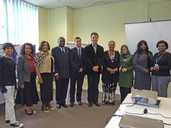Local group SSCAT Foundation (Sheffield Sickle Cell and Thalassaemia Foundation) discussed their future at their annual conference in October, which aimed to raise awareness of the most common genetic disorder in the UK.
In the changing world of health funding, the focus was on the continued importance of the service. SSCATF has been around for over 20 years but many remembered when support to families with the genetic blood disorders was only available in London. Many sufferers and their families had to travel to get extra help.
The blood disorders, Sickle Cell and Thalassaemia, are inherited illnesses that affect half a million people in the UK and are more common in people from Black and Ethnic minority backgrounds. The symptoms of Sickle Cell can be very unpredictable. It is a lifelong and disabling illness, which gives rise to painful crises that can be life-threatening. The symptoms of both disorders vary in severity, which leads to many misunderstandings about what having the condition means. It is further complicated by its genetic inheritance, which means that people can be carriers but have no symptoms.
It was clear at the conference that this complexity and even the misunderstanding of health professionals meant that the extra support from SSCAT Foundation was essential.
Professor Simon Dyson of De Montfort University told the conference of his research about how children with Sickle Cell are supported in school. 569 children were interviewed. Many felt their condition was not taken seriously, with half saying they had not been permitted to get extra water. One third said they were considered lazy and another third had been made to do inappropriate exercise.
Professor Karl Atkin, of the University of York, spoke about the misconception that they are ‘Black’ disorders when in fact the conditions affect all communities. He said it is the most common single genetic disorder, yet many doctors have a poor understanding of it. Screening for the gene is very low. In workshops, people spoke about how SSCAT Foundation’s approach helped support them in coping with the condition:
“It provides a social group with other people who understand what you are going through.”
“SSCAT will advocate on your behalf.”
“People are affected in different ways; SSCAT understand this and help increase awareness.”
“They are a link to services; they give information and education and they help build confidence to ask for the right help.”
SSCAT Foundation’s services include home and hospital visits, benefit entitlement, support groups, advocacy, and emotional support. For more information on these culturally-sensitive, free services, contact 275 3209.

